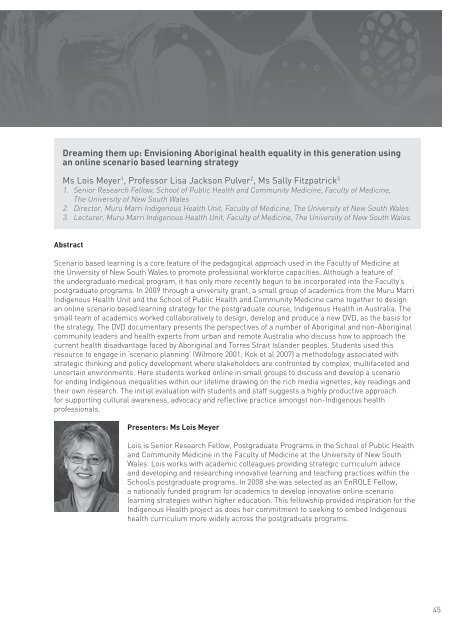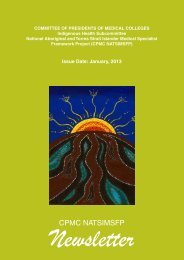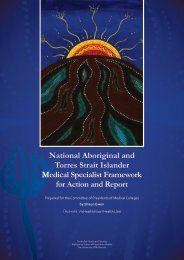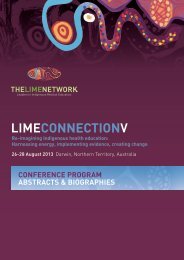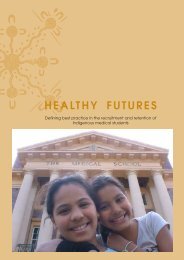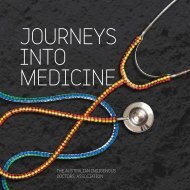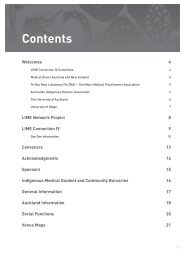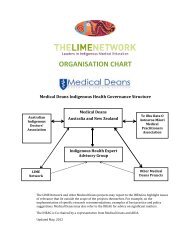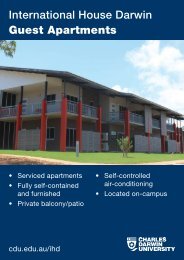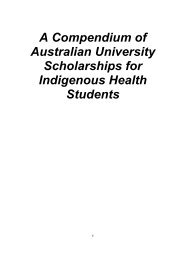abstracts and bios cover_final.indd - LIME Network
abstracts and bios cover_final.indd - LIME Network
abstracts and bios cover_final.indd - LIME Network
Create successful ePaper yourself
Turn your PDF publications into a flip-book with our unique Google optimized e-Paper software.
Dreaming them up: Envisioning Aboriginal health equality in this generation usingan online scenario based learning strategyMs Lois Meyer 1 , Professor Lisa Jackson Pulver 2 , Ms Sally Fitzpatrick 31. Senior Research Fellow, School of Public Health <strong>and</strong> Community Medicine, Faculty of Medicine,The University of New South Wales2. Director, Muru Marri Indigenous Health Unit, Faculty of Medicine, The University of New South Wales3. Lecturer, Muru Marri Indigenous Health Unit, Faculty of Medicine, The University of New South WalesAbstractScenario based learning is a core feature of the pedagogical approach used in the Faculty of Medicine atthe University of New South Wales to promote professional workforce capacities. Although a feature ofthe undergraduate medical program, it has only more recently begun to be incorporated into the Faculty’spostgraduate programs. In 2009 through a university grant, a small group of academics from the Muru MarriIndigenous Health Unit <strong>and</strong> the School of Public Health <strong>and</strong> Community Medicine came together to designan online scenario based learning strategy for the postgraduate course, Indigenous Health in Australia. Thesmall team of academics worked collaboratively to design, develop <strong>and</strong> produce a new DVD, as the basis forthe strategy. The DVD documentary presents the perspectives of a number of Aboriginal <strong>and</strong> non-Aboriginalcommunity leaders <strong>and</strong> health experts from urban <strong>and</strong> remote Australia who discuss how to approach thecurrent health disadvantage faced by Aboriginal <strong>and</strong> Torres Strait Isl<strong>and</strong>er peoples. Students used thisresource to engage in ‘scenario planning’ (Wilmore 2001; Kok et al 2007) a methodology associated withstrategic thinking <strong>and</strong> policy development where stakeholders are confronted by complex, multifaceted <strong>and</strong>uncertain environments. Here students worked online in small groups to discuss <strong>and</strong> develop a scenariofor ending Indigenous inequalities within our lifetime drawing on the rich media vignettes, key readings <strong>and</strong>their own research. The initial evaluation with students <strong>and</strong> staff suggests a highly productive approachfor supporting cultural awareness, advocacy <strong>and</strong> reflective practice amongst non-Indigenous healthprofessionals.Presenters: Ms Lois MeyerLois is Senior Research Fellow, Postgraduate Programs in the School of Public Health<strong>and</strong> Community Medicine in the Faculty of Medicine at the University of New SouthWales. Lois works with academic colleagues providing strategic curriculum advice<strong>and</strong> developing <strong>and</strong> researching innovative learning <strong>and</strong> teaching practices within theSchool’s postgraduate programs. In 2008 she was selected as an EnROLE Fellow,a nationally funded program for academics to develop innovative online scenariolearning strategies within higher education. This fellowship provided inspiration for theIndigenous Health project as does her commitment to seeking to embed Indigenoushealth curriculum more widely across the postgraduate programs.45


